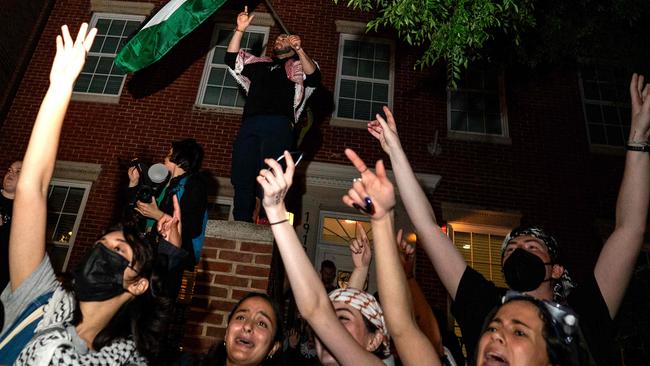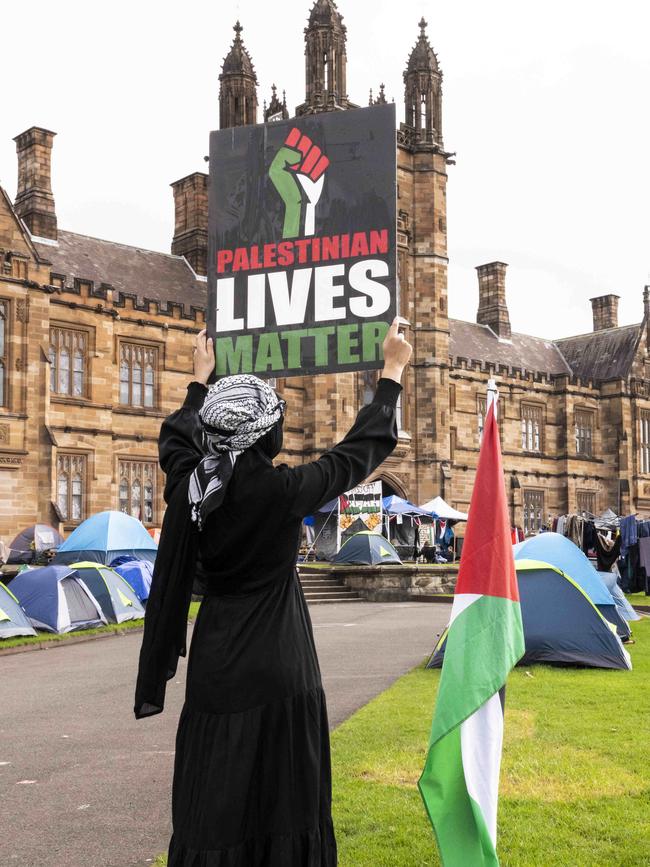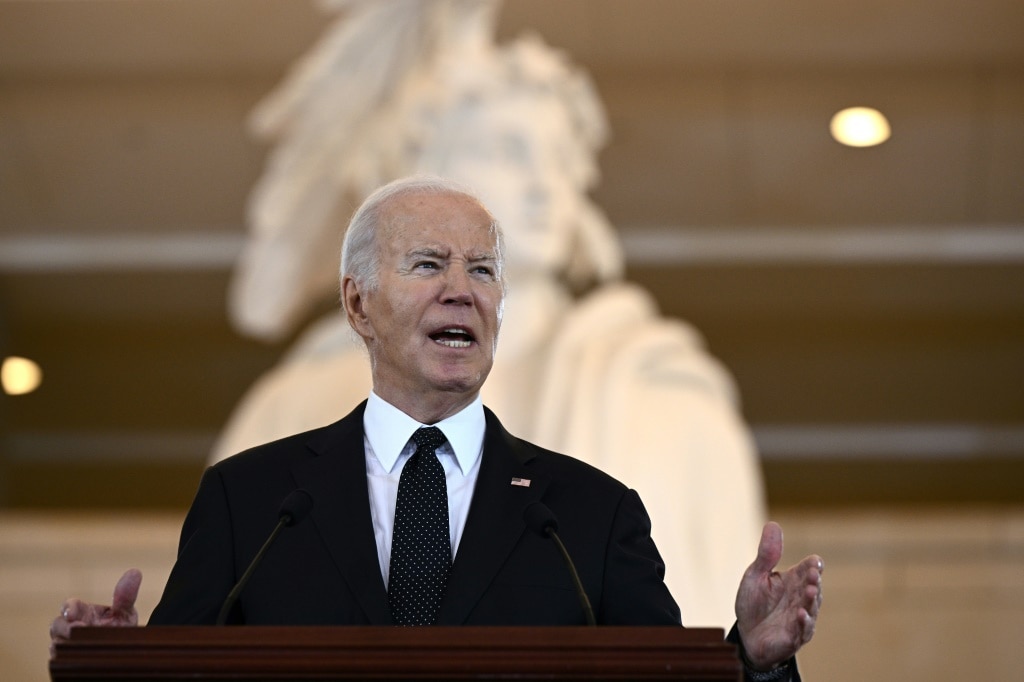
The three-week-long hissy fit by some of the most privileged, wealthy youth in the world will peter out, as the reality of career-ruining expulsions and potential criminal convictions crystallises.
By casting the protests against Israel as the manifestation of a new era of virulent anti-Semitism, governments risk overreacting, undermining valid political speech and converting genuine opposition to Israel’s policies into anti-Semitism. Excluding community colleges, the US has more than 2500 universities, around 30 of which endured anti-Israel protests over recent weeks. Around 2000 protesters have been taken into custody, according to The New York Times, out of a US university student population of more than 20 million.
If anti-Israel sentiment, let alone anti-Semitism, were genuine, protests would have broken out at the thousands of low-cost community colleges and public universities, rather than those where parents pay upwards of $US65,000 ($97,300) a year in tuition fees.
Indeed, as Donald Trump observed after his hearing in Manhattan last week, a clear minority of “student protesters” were actually students, the remainder professional organisers and agitators. Yet congress is poised to embarrass itself by passing a ridiculous law that will almost certainly be struck down by the Supreme Court. In a display of bipartisanship after days of watching pro-Palestine protesters disrupt other students and vandalise university property, the House of Representatives has passed the Anti-Semitism Awareness Act by a whopping margin of 320 to 91.
The anti-Israel protesters would think twice next time, so the thinking goes. The bill would require the US federal Department of Education, in enforcing anti-discrimination laws, to expand the definition of anti-Semitism to that used by the International Holocaust Remembrance Alliance, which is broad. Questioning the establishment of Israel, claiming Jews killed Jesus or wield outsized influence in business, or accusing a Jewish person of being more loyal to Israel than their country of citizenship, for instance, would be part of a long list of behaviours that would become illegal on campus.
The US is apparently mulling the introduction of something like our own section 18c of the Racial Discrimination Act, which prohibits any offensive behaviour based on “race, colour or national or ethnic origin”, a stupid law this newspaper admirably opposed.
The first amendment gives Americans the right to express, and for others to hear, even profoundly distasteful views – including, and perhaps especially – on political questions, foreign and domestic. A range of US state and federal laws already outlaw discrimination, not to mention prohibits actual physical assault or incitement to violence. Indeed, beyond the harsh words that inevitably accompany intense political protests, how many actual violent assaults have been perpetrated on Jews, or Muslims for that matter, in the US or Australia, as a direct result of racist sentiments inflamed by the war? The answer is very few.

This is a reason to celebrate the success of our liberal democracies. If anything, providing one ethnic or religious group with a lower threshold at which their taking offence triggers judicial consequences could stoke resentment, making the problem even worse.
The “woke” agenda that animates much of the animus towards Israel is already crumbling: MIT this month quietly rescinded its requirement for academic applicants to supply statements supporting “diversity, equity and inclusion”.
There is no doubt that criticism of Israel is sometimes a cloak for anti-Semitism, but this is not the case all the time. Walking about George Washington University recently I could see no trace of anti-Semitism. Indeed, at least 750 Jewish students supported the protests nationally. Sara Jacobs, a Jewish congresswoman from California, was one of the few Democrats who voted against the anti-Semitism bill. “I do not believe anti-Zionism is inherently anti-Semitic, it’s important that we do things that address the real rise of anti-Semitism (but) this bill would end up sweeping in so many non-violent protests on campus, and would penalise free speech on campus and everywhere else,” she said this week on cable TV.
Almost everyone is well aware of the scourge of anti-Semitism, which culminated in the worst atrocities in world history. Likening our current situation to 1930s Germany is nonsense, especially given the Nazis were then already proposing and enacting anti-Jewish laws. After the barbarism of the October 7 terrorist attacks passions have inevitably run hot, including on the Palestinian side where thousands of people have died. For me, Israel is one of the greatest triumphs of the 20th century, a thriving liberal democracy in a sea of autocracy and backwardness. But that’s not how everyone sees it.

Most of the world’s population, especially in developing nations, hold an increasingly negative view of Israel. In January, according to Time Magazine, the population of only one nation, the US, currently holds a favourable view. Only nine nations at the UN refrained from supporting Palestinian statehood however daft an idea.
A quote widely attributed to David Ben Gurion, Israel’s first prime minister, underscores what remains a totally insoluble problem. “If I were an Arab leader, I would never sign an agreement with Israel. It is normal; we have taken their country. It is true God promised it to us, but how could that interest them? Our God is not theirs. There has been anti-Semitism, the Nazis, Hitler, Auschwitz, but was that their fault?”
One state, two states, there is no solution. The shocking massacre of October 7, and Israel’s understandably tough response, have triggered another round of debate about the Jewish state’s right to exist. The good news is Israel, by far the most powerful and sophisticated country in the Middle East, isn’t going anywhere.
Time, as they say, heals all wounds, as it has in Northern Ireland. Trying to legislate away dissent will only prolong what is already set to be a long adjustment to reality for those naively hoping for “Palestine to be free”.
More Coverage
 By casting the protests against Israel as the manifestation of a new era of virulent anti-Semitism, governments risk overreacting,
By casting the protests against Israel as the manifestation of a new era of virulent anti-Semitism, governments risk overreacting,






As the war in Gaza enters a new and deadly phase, protests on university campuses might erupt again in the US or perhaps elsewhere. But allow me this prediction: they won’t.